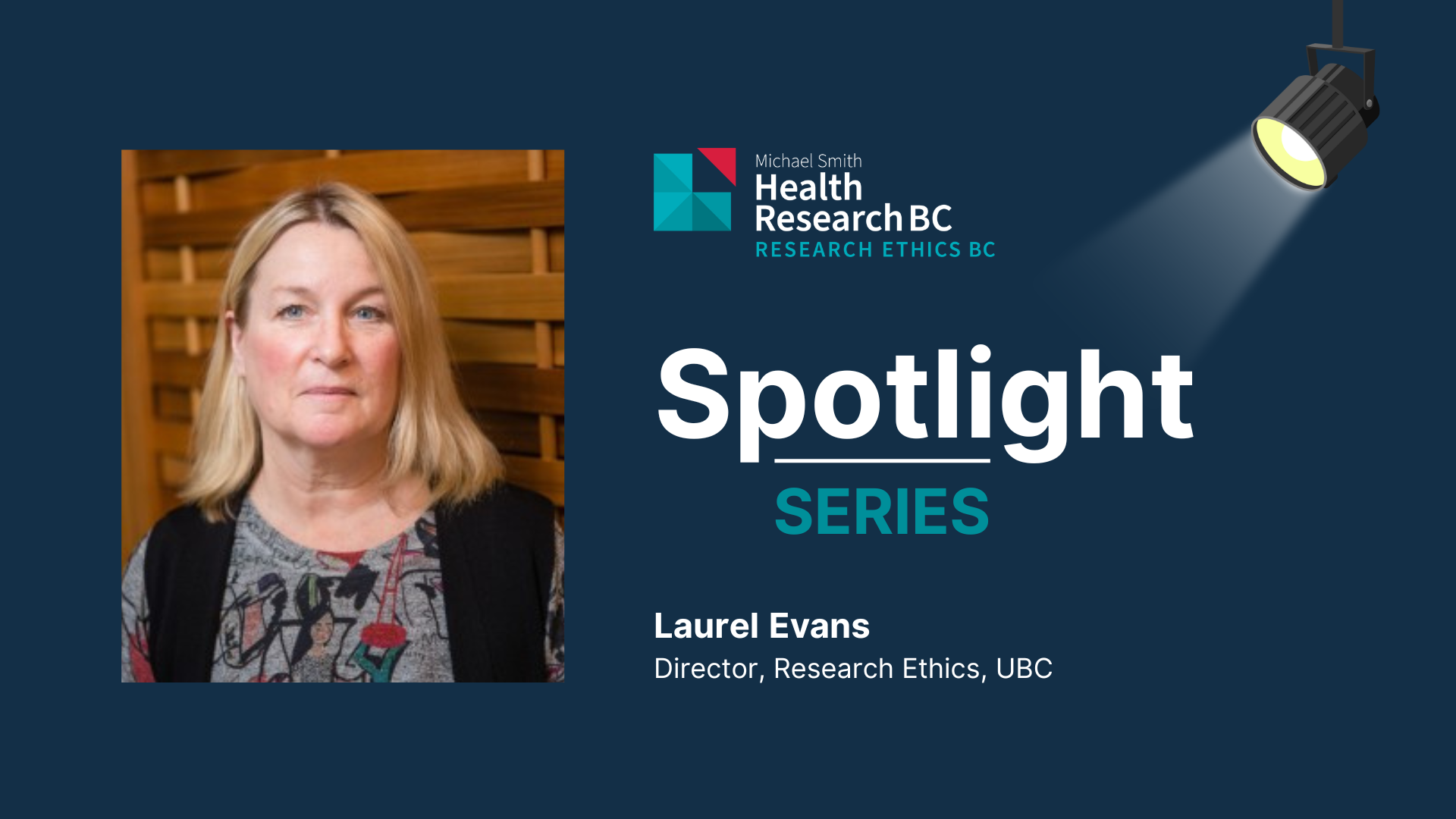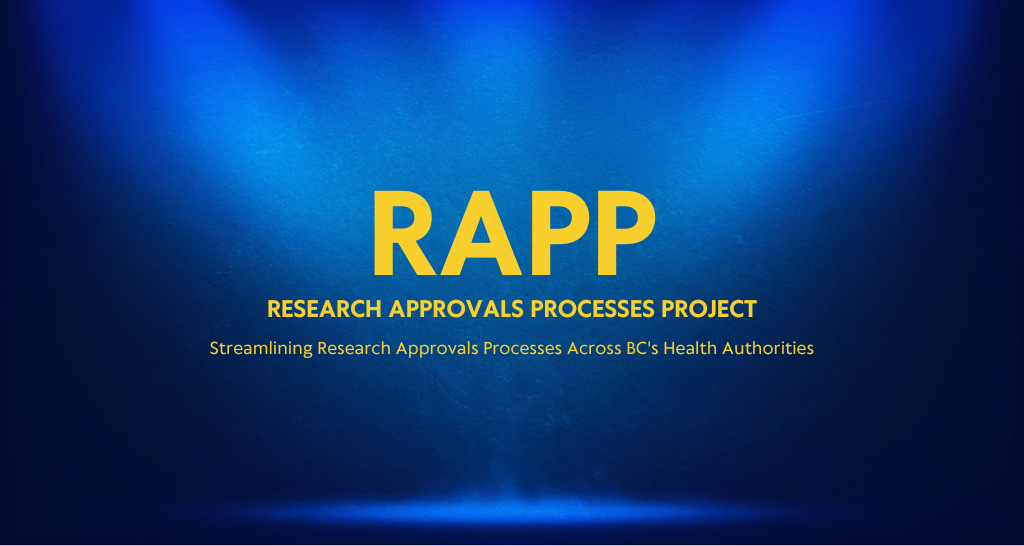Research Ethics Spotlight: Laurel Evans
6 December 2022

Every few months, Research Ethics BC’s Spotlight Series will sit down with a researcher who is on a research ethics board (REB) to learn more about their career accomplishments, what their research interests are, why they think research ethics are important, and their advice to those interested in research ethics.
For our December edition, we bring you Laurel Evans, director of research ethics at the University of British Columbia (UBC). With over 20 years of experience in research ethics, Laurel oversees the operations of the research ethics boards at the university and its affiliated hospitals. Her prior experience includes positions at McMaster University and St. Michael’s Hospital. At McMaster University, Laurel served as a senior ethics advisor, legal counsel for clinical research contracts, and an adjunct professor of health law, policy, and ethics in the health studies and health sciences programs. At St. Michael’s Hospital, she reviewed research contracts and worked on special projects. Laurel was also the legal representative on the Ontario Cancer Research Ethics Board.
She is past president of the Canadian Association of Research Ethics Boards (CAREB) and was the initial lead contact for the BC Ethics Harmonization Initiative when the grant was first funded by Michael Smith Foundation for Health Research (now Michael Smith Health Research BC). In addition, her office led the application development for the Provincial Research Ethics Platform (PREP) launched by Research Ethics BC (REBC) and UBC enabling multi-jurisdictional reviews of research ethics applications in British Columbia using a single online system.
Four years ago, Laurel was diagnosed with Parkinson’s. It hasn’t been easy, but she takes things one day at a time and remains relentlessly committed to advancing research ethics and working towards a national process of ethics harmonization for multinational studies. Below is the interview with Laurel.
Tell us about yourself and your career?
I am currently the director of research ethics at UBC and I have been doing this work either in the capacity of a director or associate director for the past 15 years. This includes being the primary liaison between the Office of the Vice-President, Research and Innovation at UBC and all the related UBC-affiliated research ethics boards.
My early career was in law. I graduated from law school in the early 80s and practised for roughly 10 years. When I stopped practising, I ended up at the Law Society of Ontario doing professional development for them, and then at McMaster University. It was a natural progression and health law and ethics made sense to me. I was much more comfortable with health law than with health ethics, but I taught both.
I used to be a baseball mom, but my son is now 24, so unfortunately, he’s not playing ball anymore. The other thing that I enjoy doing is gardening. My mom, who has sadly passed away, was a master gardener, and I have two sisters who are also majorly into gardening. We have such a great environment in BC for gardening, and I am fortunate that I get to send my relatives in Ontario pictures of my son mowing the lawn in February and pictures of the palm tree that is in front of my house.
Who or what led you to get involved in research ethics?
I started working for McMaster University on contract. Then, a position came up within McMaster’s Behavioural Research Ethics Board where I worked for several years before moving to St. Michael’s Hospital in downtown Toronto. After that, I joined UBC.
Why is research ethics important?
It is central to the research effort and it is the one thing that can exemplify to research participants that they can trust research. Without participants being able to trust research and researchers, we wouldn’t be able to do any research. I have found that since the pandemic, people are a lot more skeptical of researchers and claims about scientific and medical breakthroughs. It is important that people know that there is an independent, autonomous entity that is overseeing the study and that they can go to if there are issues.
I also think it is important for research staff to have a venue where they can express concerns. I don’t think there is much research going on where people are deliberately in conflict or trying to take advantage of people. However, it is remarkable how you lose your objectivity when it is you who is directly involved in getting a study organized.
Working as a research ethics board administrator is a gratifying job, but it is also a discouraging job at times. You must always keep in mind that overarching knowledge of why you are doing things because often you are part of the ‘criticism’ in terms of things not getting done.
People sometimes consider research ethics a barrier to research. I think it is the opposite. Research ethics is a facilitator and people who get into research ethics are the ones who want to see research happen, not the other way around.
What is your proudest professional achievement to date?
When I was the president of CAREB, we brought in a whole policy related to reporting adverse, unanticipated events. We had a system that flooded the archives with tons of paperwork and we changed it so that we don’t have to do that anymore.
I have also been instrumental in spearheading the Ethics Harmonization Initiative here in BC, as well as trying to get some national traction for accreditation and harmonization. It is still a work in progress.
What advice would you give to those who want to get involved in research ethics?
I would advise them to get involved in research first. Once you have some background in research, then keep an eye open for positions on research ethics boards. There aren’t many of us across the country so opportunities are limited. I think it is important to be flexible in terms of where you are willing to go for work. I would also recommend connecting through CAREB and any of the other local associations so that you can learn and network. I remember when I told my mother what I did for a living, she didn’t really understand. Keep having conversations with others on the importance of research ethics to help them understand.





